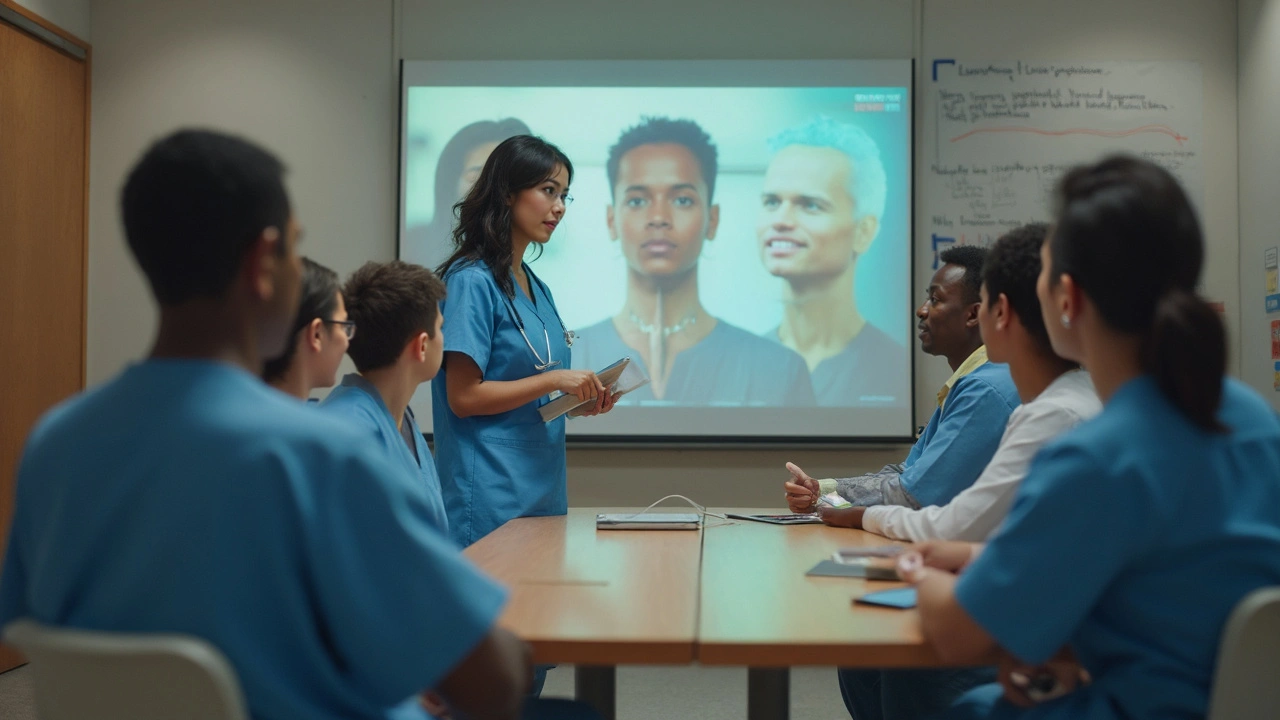 Jun, 22 2025
Jun, 22 2025
Imagine one day your mind drifts away for a little bit. You forget where you’re going, or maybe you lose track midway through a conversation. Annoying, right? But when these episodes get more intense and you start seeing the world as if through a fog, something serious could be going on. That’s the real and relentless confusion some people with liver disease face—welcome to hepatic encephalopathy (HE). This isn’t just an odd lapse; it’s a medical emergency that can upend lives. People think of liver disease and picture tiredness, yellow eyes, maybe some swelling. But cognitive chaos? Not so much. Yet, this invisible side effect is one of the most important dangers, and to avoid disaster, patients need to be equipped with concrete, practical knowledge.
What Hepatic Encephalopathy Really Looks Like
Doctors define hepatic encephalopathy as a range of nervous system problems caused when the liver’s too damaged to filter toxins from the blood. In healthy bodies, your liver clears out ammonia and other stuff you don’t need before it can bother your brain. But damage—often from cirrhosis or hepatitis—lets these toxins slip through, and suddenly, your mind pays the price. Symptoms? They are sneakier than you’d think. It starts mild: maybe you notice some mood swings, forget where you put your house keys, or find it tricky to add up grocery bills. My neighbor Lila once told me her partner phoned her from the driveway, unable to work out how to park his car. Weeks later, he didn’t recognize familiar streets. That unpredictability is what makes HE so uniquely terrifying. One day you’re you, the next, you’re trapped behind a mental wall, possibly even falling into a coma if it escalates.
Cognitive troubles make daily life a minefield—not just memory loss, but trouble concentrating, confusing words, struggling to keep up with simple tasks, or behaving out of character. Some patients experience personality shifts, while others develop hand tremors or ritualistic fidgeting. Have you seen the flapping hands, called asterixis? It’s one of those classic signs, though not everyone gets it. Here’s the thing: these symptoms can come and go, and when they do, most families chalk it up to aging or stress. But ignoring early HE is dangerous—untreated, it sends people to the ER at an alarming rate. According to data published by the American Association for the Study of Liver Diseases, as many as 80% of patients with advanced cirrhosis develop some degree of HE at some point. The difference between handling this at home and in a hospital often comes down to one thing: does the family know what to watch for?
Why Education Changes the Game
Let’s get real. Most of us aren’t taught about hepatic encephalopathy in school. Even when doctors hand over a pile of leaflets, the medical mumbo-jumbo makes it easy for crucial details to be missed. That’s why patient education—in plain language and repeated often—changes outcomes. You’d be amazed how knowing small daily routines and red-flag symptoms can actually save lives and prevent hospitalizations. Not too long ago, a Canadian study followed liver patients who took a simple HE education class. Guess what? Those who learned even the basics were 60% less likely to land in the hospital for HE within the next year. Knowledge literally keeps families together and out of crisis-mode.
But what should that education include? It’s not just about memorizing lists of medications. Patients and caregivers need to recognize how HE might appear, the things that make it worse (like constipation, infections, bleeding, missed meds), and—just as vital—when stubborn confusion signals a doctor visit. Something as minor as holding the wrong end of a fork or putting shoes in the fridge could be an early clue. I can’t count the number of times Cameron’s cousin’s girlfriend (a nurse) stressed to her cirrhosis patients, “If you can’t sign your name, call us fast.”
It boils down to giving families answers before they’re in a crisis. That means visual aids, clear action plans, and phone numbers on the fridge. My cat Topaz learned to paw at the bathroom door for treats. If a cat can learn a life hack, human families can be set up for success with the right info.

Everyday Care: What Patients and Families Must Know
Managing hepatic encephalopathy becomes less scary when you break it down into routines and early warnings. A major part of control comes from sticking to medications. Lactulose is often the go-to; it flushes out toxins, lowering ammonia. Some people need antibiotics like rifaximin too. Messing up doses—or skipping them when you “feel better”—is one of the top reasons HE spirals out of control. Families should agree on a system: pill boxes, phone reminders, caregiver cross-checks.
Diet matters as well, but not in old-fashioned ways. Doctors used to advise super low protein, but now we know people with liver disease actually need protein—just not too much at once and preferably from plant-based sources or dairy. Avoiding dehydration is key. Know what triggers flares: constipation backs up toxins, so bowel regularity is essential. Watch for dehydration (older folks are notorious for not feeling thirsty), bleeding, kidney trouble, and infections—especially urinary. Every new medication should be checked with a doctor; even some common painkillers worsen HE risk.
Don’t forget emotional health. People living with HE sometimes feel shame and withdrawal, believing it’s all their fault. Stigma makes it harder to ask for support, but talking about it openly removes blame and gets everyone rowing in the same boat. Even pets help—Topaz curls up whenever I’m stressed, proving families aren’t just human. Here’s a handy list for the fridge:
- Keep all medications in a visible, pillbox organizer
- Track bowel movements—missed days need action
- Write down new symptoms daily, even odd ones
- Check alertness: slurred speech, confusion, trembling, or handwriting changes mean call for help
- Stay hydrated: aim for 6-8 glasses of water unless advised otherwise
- Avoid alcohol, certain painkillers, and anything not okayed by your liver doctor
- Get vaccinated (flu, pneumonia, hepatitis) since infections can push HE over the edge
- Make a clear emergency plan including the nearest hospital and update it every year
Families who set up rituals avoid panic. Even simple things like reviewing symptoms with friends or at support groups can help catch warning signs early. Grab a cheap whiteboard and mark off daily check-ins—it works better than hoping someone just “remembers.”
Spotting and Responding to Flare-Ups: Don’t Wait and See
Fast action saves lives when hepatic encephalopathy starts to smolder. Picture this: you notice your partner mixes up common words or falls asleep at odd times. Don’t ignore it. The earlier you catch a flare, the faster you can reverse it. The classic thinking is to monitor the “Four T’s”—Tiredness, Tremor, Trouble talking, Trouble focusing. Any change could mean toxins are climbing in the brain again.
What happens if you spot these? Here’s a practical run-down:
- Check medications. Has a dose been missed?
- Ask about bowel habits—constipation is a top trigger; if more than 1-2 days passes without a bowel movement, call the medical team.
- Look for other problems: recent vomiting, fever, urinary symptoms, blood in stool or vomit, or dehydration (no urine output for 6+ hours).
- If symptoms are mild (just a bit foggy), call the liver clinic or doctor right away—don’t wait until things spiral.
- If there’s severe confusion, inability to stay awake, or personality shift, go to the ER without delay. Don’t drive yourself—call an ambulance if possible.
Upsetting as it can be, don’t try to talk someone out of their confusion. HE is a medical state, not a choice. I’ve seen people insist “snap out of it!” but that only breeds shame and panic. Instead, calmly explain you’re getting help. Emergencies can escalate from mild confusion to coma in a few short hours. Treat every episode with urgency, every time.
Here’s a quick HE symptom severity table borrowed from the World Gastroenterology Organization:
| Grade | Symptoms |
|---|---|
| I | Mild mental slowing, trouble with simple tasks |
| II | Lethargy, confusion, disorientation, slurred speech, personality change |
| III | Somnolence, inability to follow commands, gross confusion |
| IV | Coma; unresponsive to pain or speech |
Keeping this chart on hand—or saved to your phone—makes it easier for every family member to identify where someone is in real time, instead of panicking or waiting too long.

Empowering Yourself and the Team Around You
The real secret to managing hepatic encephalopathy is teamwork. No one should shoulder this alone. If you’re living with liver disease, find at least one “care partner” who knows what to look for. That person can be a spouse, a grown child, a sibling, or a reliable friend. In my house, it’s always Cameron. He knows to ask if I’m acting “off”—and isn’t shy about over-reacting if needed. Build a circle of support. Educate every person who might answer the phone—neighbors, church friends, even the pharmacist if you rely on them often.
Invest in resources. The American Liver Foundation and local hospital support groups put out concise handouts, workshops, and videos that are easy to share. Grab pamphlets for the bathroom magazine basket—it’s not glamorous, but it works. Get comfortable with tech tools: medical alert apps, smartphone reminders for meds, or simple online symptom trackers. My best friend’s mom uses a color-coded Google sheet to keep the family on the same page across states. There’s no shame in extra help.
If anxiety or sadness creeps in—which is nearly universal—don’t ignore your mental health. Ask your team or doctor for counseling referrals; group therapy specifically for chronic liver patients exists and makes a genuine difference. Stress is real for caregivers, so check your own batteries, too. Laughter helps. When things get overwhelming, sometimes all you need is a cat like Topaz curled on your lap.
So, the takeaway? Don’t underestimate the power of patient education with hepatic encephalopathy. A well-informed family can spot a crisis before it explodes, tap into the right plans, and keep life as routine (and joyful) as possible. With knowledge, patients and loved ones get to live—and not just survive.

Robert Gallagher
June 28, 2025 AT 14:17And yes, Topaz is a better caregiver than most family members.
Howard Lee
June 29, 2025 AT 14:35Nicole Carpentier
June 30, 2025 AT 11:38Hadrian D'Souza
June 30, 2025 AT 19:18Brandon Benzi
July 1, 2025 AT 21:01Abhay Chitnis
July 2, 2025 AT 07:40Robert Spiece
July 4, 2025 AT 04:47Vivian Quinones
July 4, 2025 AT 09:45Eric Pelletier
July 4, 2025 AT 17:06Marshall Pope
July 5, 2025 AT 09:09Agha Nugraha
July 6, 2025 AT 22:19Andy Smith
July 7, 2025 AT 18:41Rekha Tiwari
July 8, 2025 AT 19:50Leah Beazy
July 9, 2025 AT 00:25John Villamayor
July 10, 2025 AT 17:35Jenna Hobbs
July 11, 2025 AT 23:55Ophelia Q
July 12, 2025 AT 10:33Elliott Jackson
July 12, 2025 AT 18:19McKayla Carda
July 13, 2025 AT 08:53